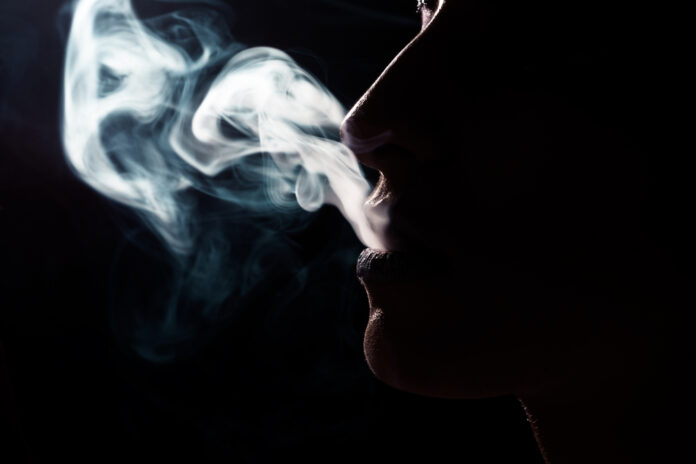We all know the harms of smoking and in fact there is nothing healing about it, so why do doctors smoke?
I grew up with parents who were both doctors, and who both smoked. They were trained in the 1950s, when it was still fashionable to smoke, when doctors even advertised its ‘calming’ benefits and promoted its use … but they also lived through the mounting and eventually irrefutable evidence that smoking was harmful, and they continued to smoke. They were very intelligent people, so why were they willing to override that intelligence, not only of the scientific evidence, but the evidence of their bodies … the morning cough, the breathlessness on exercise, their angina … and only gave up smoking later in life after they had both had open heart surgery for their cardiovascular disease.
When I was young I found smoking disgusting … the smell of it, the smoke polluting the air in the house, the stains on fingers and teeth … and vowed I would never smoke when I grew up.
Yet I did.
‘Do as I say, not as I do’ did not have the desired effect and ever-curious as I was, I gave smoking a try. My first puff caused me to cough and gasp and burnt the delicate lining of my air passages, but I pushed through and had another and another … I started smoking at age 15, stealing cigarettes from my mother’s packets and sneaking outside to smoke them. Just a few here and there at first, and then it became a habit. One day my father came inside having found cigarette butts all over the lawn while he was mowing it and asked me if I was smoking and I lied and said no. So I started lying too. As drug addicts do.
Once I left home and went to university I started drinking and smoking … a lot. And continued for several years, all through medical training and into my specialty training. I eventually stopped drinking, when I realised it was not compatible with performing microsurgery or a living a long and healthy life, but it took me another two years to stop smoking, I was so addicted to it. I did not actually want to stop, but I was working in a hospital, and sick of feeling like a social pariah and sneaking out to the back alley to have a cigarette with the rubbish bins. Plus my then boyfriend did not smoke and understandably, did not like it.
So I stopped. Just went cold turkey from 30 a day to none. No cutting down, no weaning off, no patches, gum or drugs. I just said no, no more. When the cravings came up, I just kept saying to myself: ‘You don’t smoke’ and for whatever reason, it worked for me. For the first 48 hours, I wanted to kill everyone on the planet except myself. I was furious. Then I calmed down a bit and ate a strawberry. It was the most delicious thing I had ever tasted.
As my previously bludgeoned senses slowly recovered, I started to enjoy the smells and tastes of food again, the freshness of the air, and the freedom from being addicted to a substance that had me ‘by the short and curlies’ as they say.
I realised that smoking cigarettes had been a potent numbing agent for me, my go-to resource whenever things got tough. And I started to look at why. Without the constant numbness, I started to feel, truly feel. Feel what lay underneath my ‘everything is fine, there is nothing to see here’ veneer. Feel how anxious, angry and sad I was. And deal with it, step by step, as lovingly as I could.
We have a collective tendency to judge people who still smoke, without bothering to stop and ask: Why?
Why do something that makes no sense?
What is underlying their continuing need for this drug in the face of the ever-increasing cost of it financially and the toll it takes on their health?
I used to look in wonderment at old ladies in wheelchairs needing oxygen for their chronic airways disease who were still smoking; at old men with tracheostomies inhaling through the hole; at amputees puffing away outside the hospital; at pregnant women sucking on cigarettes. It made no sense to me. And it doesn’t, until you realise they are addicted to a drug, and they cannot or don’t want to stop because they don’t want to feel what they don’t want to feel.
You cannot make people stop smoking, including doctors. I know from personal experience there are cardiologists, respiratory physicians and vascular surgeons who still smoke, which makes no sense at all. These are very intelligent people, with medical training and experience. With all their intelligence, with everything they know about the human body and the harms of smoking, they continue to do it. What if there is more to intelligence than just mental acuity, the ability to understand, remember and recall things? What if we accumulate hurts in life that cannot be healed with mental intelligence? And what if there is a deeper intelligence that can help us to deal with these hurts?
We cannot deal with our addictions on the surface without dealing with the underlying root cause.
We have to be able to get underneath why we are doing what we are doing, without judging ourselves or giving ourselves a hard time. This means observing our behaviour, deepening our understanding of why we do what we do, and getting support if needed to deal with what lies beneath any of our self-destructive ways of coping, be they over-eating, smoking, drinking alcohol or less tangible things like being addicted to social media, TV or porn.
The root of all my addictions has been a lack of connection, to myself, to others, and especially to the essence of who I am, my Soul. The way back has been developing that sense of connection, first through the inspiration and loving support of dear friends, and then through my ever-developing relationship with my innermost essence, until the point where I can now be that support for others.










I love your writing Anne, you bring such a wisdom to any subject. We can get so caught into a blame or ‘holy than thou’ culture but you bring everyone the opportunity for a deeper understanding of what is really happening. Thank you.
How gorgeous it is to feel addiction being addressed in the way you have addressed it here, Anne. We all have our addictions in one way or another; your sharing creates the space for love to bring forth a shift in perspective and shatters the pictures and beliefs we as a society have of addicts and addictions.
Such an important topic for all in healthcare, both for the care of self and also in relation to our patients. It is so easy to be judgmental and harsh on ourselves and others in relation to any addiction. A compassionate approach looking beyond the addiction to the underlying issues – whether that be trauma or lack of self-awareness. I have done some smoking cessation counselling and always tell clients that smoking is one of the hardest addictions to overcome.
Thank you Kay,
that is so commonly heard, and has also been my experience… of the things I have been addicted to, the hardest to let go of was smoking… and giving myself a hard time!
with love, Anne❤️
I’m a family med PA and currently contemplating quitting smoking. I started my training at the age of 29 and have been dealing with the shame of smoking since about that time. Constantly hiding it, feeling inferior, feeling like an imposter. My patients would be shocked that I smoke. Your words spoke to me on a deep level. It’s nice not to feel alone. I too, have used cigarettes to numb myself and ride this, “I’m fine” wave. I’ve been seriously contemplating quitting for the last 2 years. I probably think about it almost every hour that I’m awake. I’m currently using an app called QuitSure for some help reprogramming myself. On the last day, you quit cold turkey and basically approach it the same way you did. I pray that I am able to finally be done with this addiction and embark on a journey of connecting to myself more authentically. I know it will benefit myself, my loved ones, and my patients.
Thank you for writing of your experience. I came across it by googling “doctors who smoke,” looking for inspiration. I look forward to exploring more of your writing. Thanks again
Thanks so much Ashley for your beautifully honest email. As doctors, it is very difficult for us to pretend to be superhuman when we are as human as everyone else! We feel we need to hide our human flaws and that puts awful pressure on ourselves and our relationships, at work and at home. Of course we have to live and work with responsibility and integrity, but that does not mean we have to be perfect. And being honest about our weaknesses is the first step in dealing with them. You are most definitely not alone and always remember that, if you are ever struggling, with anything. I always say that if I can do it, anyone can do it. But I did not do anything by willpower alone, rather by caring for myself and building the love in my body to the point where I loved myself enough to not harm myself any more… this is still a work in progress as there is no perfection in a human body, but when I stopped giving myself a hard time about anything and everything, the healing could begin… please keep in touch and let us know how you go… with love, Anne
Thank you for this article, Dr. Malatt
Your article has helped me to understand that addictions and self medicating to numb emotional and psychological pain, trumps intellectual knowledge almost all the time. And now, I have a better appreciation of way otherwise intelligent and knowledgable people, like yourself, would engage in a self-destructive practice like alcoholism and smoking a pack and a half of cancer-sticks a day, like you did, up to when you quit. You didn’t say what year your cessation occurred; but from the timeline you gave about when your parents went to med school, I would guesstimate this was somewhere in the mid to late 90s when alternative nicotine delivery technology (patch, vaping, etc.) was in its infancy and not widely available or safe. While I have never had to go through the withdrawal of nicotine myself, I am really impressed that you went from 30 cigs to 0 in one go and had the discipline to not give in.
A few years ago, one night when I was an Uber driver, I picked up 4 of young ladies from a rave party. After they got in my car and we commenced the trip, they were talking about all the recreational narcotics they’ve tried and enjoyed. They talked about MDMA, ketamine, cocaine, etc. I don’t recall them mentioning any opiates though.
AnyWho, as the trip went along, the conversation changed to shoptalk. I don’t remember exactly what they said, but they were talking about something like titration levels and pH levels. In short, they were talking about best practises for administering a kidney dialysis. And that’s when I realized: ‘Oh my goodness! These girls are actually at least RNs if not physicians.’ And they pretty much confirmed it when they jokingly said to me: “Peter if you come to our hospital we’ll make sure you get the best treatment.” I went along with the vibe of the conversation; however, internally, I was quite disturbed by what I was hearing. For context, when I was a teenager, and my first girlfriend said she wanted to try cocaine, I begged her with tears in my eyes, not to do it.
A week later, I had an appointment with my dentist, who is about our age, and I mentioned this rideshare trip him; and he responded with a hearty laugh. He said that just because people are medical professionals, doesn’t mean they don’t have addictions and vices, or abuse the narcotics they have access to. He told me that he personally knows of dentists who abuse their laughing-gas supplies. And he said that his daughter, who is a physician, knows of other physicians who abuse the narcotics at the hospitals they work in.
We lay-persons-to-medicine often look up to physicians as examples of well educated success and calm, productive living. So it’s quite a shock to us when we find out that some physicians (not all) have the same vices we mere mortals have, if not worse.
In the end, we’re all human, regardless of how successful our lives professionally turn out.